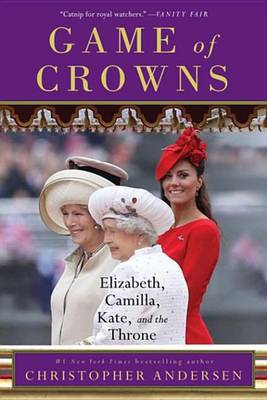Reviewed by jesstheaudiobookworm on
Although the majority of the book’s broad strokes were common knowledge, Andersen provided plenty of new details, seemingly derived from “insiders”. Game of Crowns kept my interest far better than my most previous royal reads. No one subject was concentrated on for too long and a number of approaches were taken to tell the story. There were a number of personal quotes from and about members of the royal family that enhanced the underlying significance of what Andersen said.
He broached the subject of abdication (the queen stepping down) with more seriousness than most other royal commenters. Andersen purported that this is a very real possibility, especially if the Duke of Edinburgh passes before the queen. He pointed to the long list of “nevers” that Her Majesty has already overturned (paying taxes, opening her homes to tourists, decommissioning the Brittania, and so on) as evidence that an abdication is still possible, no matter the refusals.
I especially enjoyed Andersen’s projection into the future of the monarchy, beginning with Elizabeth II’s passing. He painted a realistic, if somewhat cynical, picture of a post-Elizabethan monarchy. Andersen made it clear that he believes Charles’ accession and Camilla’s subsequent crowning as queen could very well lead to the end of the British monarchy.
My largest criticism of other royal-themed works of nonfiction has been that they seemed glaringly propagandized. I learned long ago that all royal biographies are biased, albeit some more heavily than others. Game of Crowns maintained a façade of professional journalism longer than most, while including juicy tidbits one might find in a tabloid. It was initially hard to tell whom exactly Christopher Andersen was favoring, as nearly everyone seemed to be painted in an unflattering light at one point or another. Diana, the late Princess of Wales, was neither wholly romanticized, victimized or villainized. This was incredibly refreshing. Most royal biographies tend to harp on Diana for much too long, all the while offering an incredibly skewed viewpoint of her.
Unfortunately, any pretense of overall fairness or objectivity was abruptly dropped each time The Duchess of Cornwall (Camilla) was mentioned. She was undeniably painted as the villain in Game of Crowns. So much that I found myself almost involuntarily empathizing with her. In that respect, Andersen’s plans seem to have backfired. To be clear, no one was exactly written as a “sympathetic figure”, but Andersen definitely came down on Camilla the hardest. His somewhat nasty attack on her caused me to question the reliability of Andersen’s other information. He was pushing the reader so hard in one direction (the anti-Camilla direction) that it came across as extremely imbalanced and nearly personal.
Most other figures were given a more balanced and seemingly fair covering, with the possible exception of Prince Harry. Harry was not mentioned very often, but when he was, it was mostly just to bring up a past indiscretion. The infrequency, at least, is understandable as Harry was not portrayed as a central figure (surrounding Elizabeth, Camilla, and Kate). He was unapologetically given the “Spare” treatment. Fans of Prince Harry, skip this one.
Narration review: Simon Prebble’s narration lent an air of respectability to what could have come off as another tabloid-fueled tale. His posh accent suited this audiobook perfectly and made the listening experience most enjoyable. Prebble caused the nearly 9 hours to fly by. I wouldn’t hesitate to pick up another of his works. ♣︎
Reading updates
- Started reading
- 14 February, 2017: Finished reading
- 14 February, 2017: Reviewed
